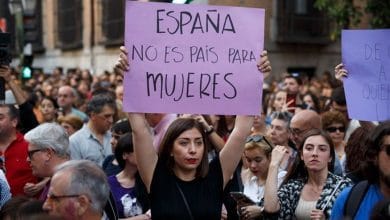
Catalonia: Breaking Up is Hard To Do
Elections in Catalonia may launch a secession battle Europe is not ready for
BENIGNO ROMERO, a Catalan taxi driver, reached coyly into his pocket and produced a key-ring bearing the horizontal gold-and-red striped flag of Spain. “I respect everyone else’s opinion. But if we get independence our pensions will go and this will be like Venezuela,” he said. Mr Romero’s worries reflect an increasingly bitter debate in this wealthy corner of north-east Spain as it prepares for elections that could bring a unilateral declaration of independence within 18 months.
Catalonia’s president, Artur Mas, has proclaimed regional elections on September 27th to be a plebiscite on independence. His centre-right Catalan Democratic Convergence party has teamed up with Catalan Republican Left and grass-roots separatists to present a joint list of candidates. If these, together with radicals from the Popular Unity Candidacy, win a majority of seats, they threaten to declare independence in spring 2017, setting up a dramatic confrontation for which neither Spain nor the European Union is prepared. While negotiations might prevent that happening, separatists seem unlikely to settle for anything less than a proper referendum—which the government in Madrid, led by prime minister Mariano Rajoy’s Popular Party, has so far refused.
Polls show that a narrow majority of Catalans prefer to remain Spanish. But they also suggest highly-motivated separatists are more likely to vote and may give Mr Mas the thin parliamentary majority he considers sufficient to embark on this defiant course. That is why Mr Romero is worried about his pension. On September 21st the governor of the Bank of Spain, Luis María Linde, said he saw little chance of Catalonia breaking away. But he gave a warning that without the backing of the European Central Bank, capital controls on Catalan bank deposits (akin to the limits imposed on Greece this summer) could follow. Mr Mas responded by warning that Spain too would suffer if there was no deal, as Catalonia, which accounts for a fifth of Spain’s economy, might refuse to pay its share of the national debt.
This unseemly stand-off has investors perplexed. Catalonia’s own regional debt yields are rising, though overall foreign investment is growing and Moody’s, a ratings agency, does not see independence as likely in the next three to five years.
Yet the 1m separatists who took peacefully to the streets of Barcelona on September 11th to mark Catalonia’s “national” day were a reminder of just how deep passions run. Lluis Llach, a famous Catalan-language singer whose protest anthems were heard across Spain in the 1970s, heads Mr Mas’s “Together for Yes” list in the northern province of Girona. A constitutional court ruling that struck out parts of a self-government statute in 2010 shattered his dream that a constitution drawn up after the death of dictator Francisco Franco would allow Spain to become “a nation of nations”, including not just Catalonia, but also the Basque Country and Galicia. It also pushed Mr Llach, and many other Catalans, towards active separatism.
Mr Rajoy believes Mr Mas will lose the vote. In case he is wrong, however, the government is beefing up the constitutional court’s powers to prevent a new regional government creating some of the institutions needed by an independent Catalonia. He also has an eye on general elections, due in December; parties seen as soft on Catalan independence may suffer in the rest of the country.
Mr Mas’s separatists can only be defeated on September 27th with the aid of what the government calls the “radical leftists” of Podemos. These have allied with others who see the pro-business Mr Mas as an austerity hawk and want working-class Catalans who do not normally vote—many from families who migrated from elsewhere in Spain—to turn out to evict him. Opinion polls are too close for accurate predictions about the result. The only certainty is that a victory for Mr Mas will create more uncertainty. That will not help either Spain or Catalonia as they try to maintain the momentum of economic recovery after a long recession.


Lo explicas a tu manera… Catalunya quiere votar por un referéndum acordado. Si España no quiere cooperar se hará unilateralmente, però desde un principio es dialogo.
Que gorrones los Españoles ¡dejen que Catalunya se independice!
Catalunya independiente tiene un potencial enorme, por eso no la quieren perder, por nada más.